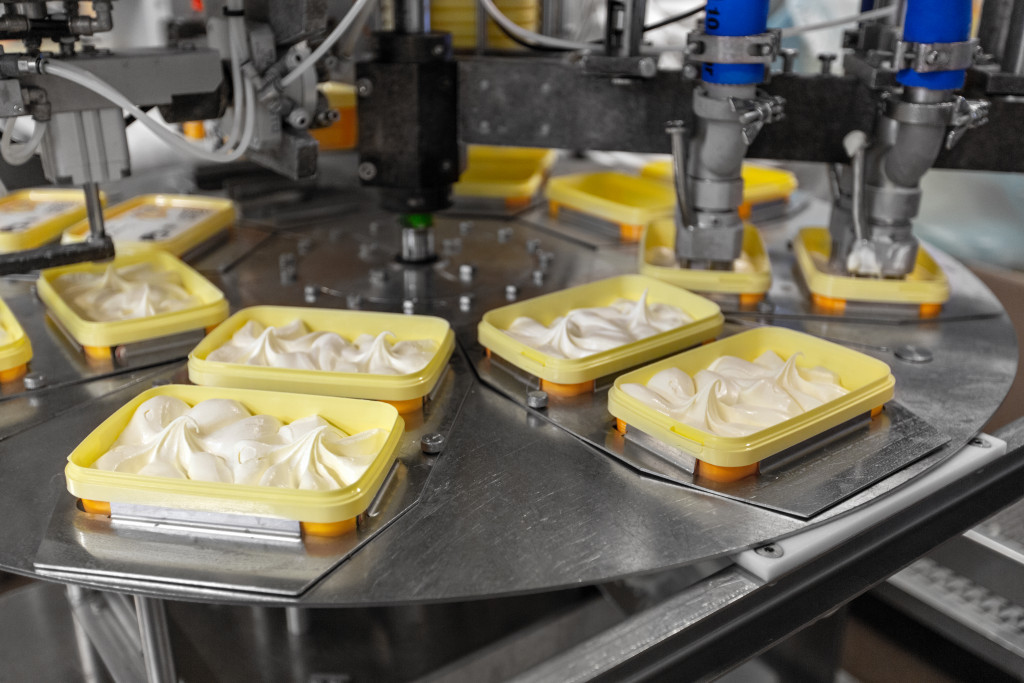• Incorporating the latest technologies into food manufacturing processes can improve accuracy, speed, cost-effectiveness, and product traceability.
• Automation systems such as robotic arms and conveyor belts can increase production speed while reducing labor costs.
• Quality control software, sensors, and other monitoring tools help identify any potential problems in the production line.
• Advanced surveillance systems, automated lockdown protocols, and employee ID verification systems help ensure safety and security in the facility.
• Risk management solutions allow businesses to better identify potential risks before they become an issue.
The food industry is rapidly changing and evolving. To keep up with the ever-increasing demands of consumers, you must stay ahead of the curve by incorporating the latest technologies into your food manufacturing process. You can improve accuracy, speed, cost-effectiveness, and more by doing so. Here are the reasons why you should incorporate the latest technologies into your food manufacturing process:
Speed and Cost-Effectiveness
Using advanced automation systems such as robotic arms and conveyor belts in the production process can significantly increase speed and cost-effectiveness. For example, robotic arms can help reduce labor costs by quickly sorting through products on a conveyor belt rather than having workers manually inspect each product. This increased efficiency in production helps cut costs which can then be passed on to customers in the form of lower prices or higher-quality products.
Accuracy and Efficiency

The use of modern technology enables food manufacturers to accurately track their production processes while ensuring that they are running as efficiently as possible. This not only helps them stay on top of their production schedule but also ensures that they are producing products that meet all safety standards and regulations. With quality control software, sensors, and other monitoring tools, food manufacturers can quickly identify any problems or areas for improvement in their production line.
Additionally, various machines can be used in the food manufacturing procedures itself to help ensure an efficient and accurate production process. For example, a piston-filling machine is a high-speed and accurate piece of equipment that can fill products with the exact required amount of ingredients. This helps to avoid waste and ensure the correct ingredients are used in the product. Other machines, such as vision systems and scanners, can help ensure that the right product is being produced with the right specifications.
Product Traceability and Quality Control
Modern technology allows food manufacturers to quickly trace products throughout their entire supply chain from farm to store shelf. By tracking the origin of ingredients used in their products, food companies can better ensure that they are meeting safety standards and regulations set forth by government agencies such as the FDA or USDA. Additionally, modern technology enables companies to employ sophisticated quality control procedures such as temperature monitoring systems or RFID tags which help prevent spoilage or contamination from occurring during transport or storage processes.
Safety and Security

There are numerous safety and security risks that food manufacturers need to consider when producing their products. By incorporating modern technology, companies can better monitor the production process in order to identify any potential hazards before they occur.
There are many innovative technologies you can incorporate into your manufacturing process for increased safety and security, and these are the best ones:
Use of Advanced Surveillance Systems
Using advanced surveillance systems such as CCTV cameras and motion sensors can help monitor the production process for any safety or security issues.
Automated Lockdown Protocols
Installing automated lockdown protocols in your facility ensures that employees and equipment remain safe if a security breach occurs.
Employee ID Verification
Implementing employee identification verification systems can help keep unauthorized personnel from entering restricted areas of the facility, thus protecting sensitive data and materials.
Remote Access Control
Utilizing remote access control solutions helps food manufacturers limit access to their facilities by allowing them to manage who is allowed into certain areas at particular times remotely via software applications or other methods of communication technology.
Risk Management Solutions
Integrating risk management solutions into your manufacturing processes allows you to better identify potential risks before they become an issue, helping protect employee safety and product quality standards.
Safety and security in the food industry are of utmost importance, and these modern technologies can help ensure that your production processes meet all relevant standards and regulations.
In conclusion, incorporating the latest technologies into your food manufacturing process can help you improve production accuracy, speed, and cost-effectiveness. It also allows for better product traceability and quality control while improving safety and security measures in the facility. By implementing these modern solutions, businesses in the food industry will be able to stay ahead of their competitors and keep up with changing consumer demands. Moreover, they are sure to benefit from improved efficiency across all areas of operation as well as increased customer satisfaction levels due to high-quality products that meet or exceed regulatory standards.





